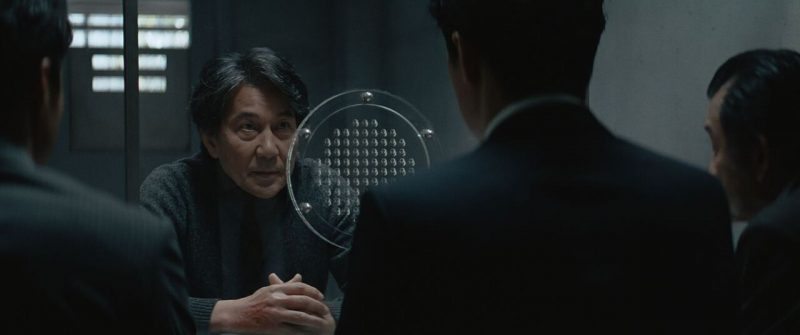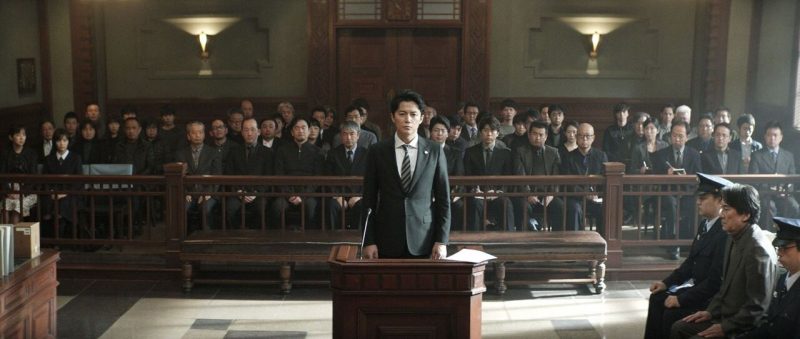The Third Murder Review
"A different look from acclaimed director Hirokauzo Kore-eda"
The Third Murder provides an obtuse look into the acclaimed Japanese director, Hirokazu Kore-eda. The father of several engrossing familial dramas (
After the Storm; Our Litter Sister; Like Father, Like Son) shifts his focus to a lawyer’s relationship with his client and, in more broadly, with the foundations of the Japanese legal system. The muted backdrop of the legal system is an uncanny choice for a director whose films live within that space between a parent and his or her child. Kore-eda is so targeted in every angle that fans of his films will find themselves searching for a meaning that may not be intended.
The Third Murder, while occasionally faltering to a stressed rhythm, still gifts its audiences with a precision from the masterful director.
[caption id="attachment_102732" align="alignnone" width="800"]

Photo courtesy of ar;pr.[/caption]
Shigemori (Masahuru Fukuyama) is a well-defined criminal defense attorney who agrees to defend Misumi (Kôji Yakusho) in the charges of murder and robbery of his former supervisor. Misumi has already confessed to the crime of murder. Shigemori’s goal is to now to prevent Misumi from receiving the death penalty. Misumi is no stranger to incarceration. He spent 30 years incarcerated from a previous murder conviction. Defending a crime of this magnitude will not be an easy task. In order for a positive outcome it will take Shigemori to calculate a legal theory rather than to analyze the truth.
Misumi’s story quickly unravels and the chain of events become opaque. His motives are less remembered and whatever theory that Shigemori develops must be reactionary. Misumi is no ordinary man, nor would he potentially enact an ordinary murder.
The light of the legal system in this film focuses on its inability to mend to an abnormality like Misumi. Both the prosecuting attorney and the judge are so painfully rigid. It is not until Shigemori breaks from his predefined mold that any emotion is instituted.
[caption id="attachment_102733" align="alignnone" width="800"]

Photo courtesy of ar;pr.[/caption]
Kore-da’s courageous steps outside of his normality to question the Japanese legal system is something to admire. Kore-eda attacks a storyline that has been previously vetted within other films, but the precision in which he allows the camera to focus on its targets permits the audience to forget that. A storyline may have been created but it does not yet have to be vested. To reach an alternative conclusion even after the films ending would be an injustice to Kore-eda.
The film is superbly acted. It is clear that much of the cast has worked with Kore-eda within his previous films. When you are a family you know where to press and where to retract. Without this sense of conformity, the inaccuracies in the film would have been more exposed. The tempo tends to strain in scenes between Shigemori and Misumi. While these interactions are most important to build a theory between the two protagonists, a slightly stressed scene can alter these sensitive moments. Being a huge fan of Kore-da’s artistry, I found myself dissecting each engagement to the point that I would miss some of the premises.
It is at the unplanned moments where we are most vulnerable.
The Third Murder is Kore-eda’s vulnerability. He is a scientist of his craft. The unique and uncharted always elicits more than any predisposition.
Pros
- Superb acting from a familiar cast
- Kore-eda's cinematography is on its own playing field.
Cons
- Fans of Kore-eda may be turned off by the lack of a familial inquisition.
- The tempo of the film can be exaggerated.
 Photo courtesy of ar;pr.[/caption]
Shigemori (Masahuru Fukuyama) is a well-defined criminal defense attorney who agrees to defend Misumi (Kôji Yakusho) in the charges of murder and robbery of his former supervisor. Misumi has already confessed to the crime of murder. Shigemori’s goal is to now to prevent Misumi from receiving the death penalty. Misumi is no stranger to incarceration. He spent 30 years incarcerated from a previous murder conviction. Defending a crime of this magnitude will not be an easy task. In order for a positive outcome it will take Shigemori to calculate a legal theory rather than to analyze the truth.
Misumi’s story quickly unravels and the chain of events become opaque. His motives are less remembered and whatever theory that Shigemori develops must be reactionary. Misumi is no ordinary man, nor would he potentially enact an ordinary murder.
The light of the legal system in this film focuses on its inability to mend to an abnormality like Misumi. Both the prosecuting attorney and the judge are so painfully rigid. It is not until Shigemori breaks from his predefined mold that any emotion is instituted.
[caption id="attachment_102733" align="alignnone" width="800"]
Photo courtesy of ar;pr.[/caption]
Shigemori (Masahuru Fukuyama) is a well-defined criminal defense attorney who agrees to defend Misumi (Kôji Yakusho) in the charges of murder and robbery of his former supervisor. Misumi has already confessed to the crime of murder. Shigemori’s goal is to now to prevent Misumi from receiving the death penalty. Misumi is no stranger to incarceration. He spent 30 years incarcerated from a previous murder conviction. Defending a crime of this magnitude will not be an easy task. In order for a positive outcome it will take Shigemori to calculate a legal theory rather than to analyze the truth.
Misumi’s story quickly unravels and the chain of events become opaque. His motives are less remembered and whatever theory that Shigemori develops must be reactionary. Misumi is no ordinary man, nor would he potentially enact an ordinary murder.
The light of the legal system in this film focuses on its inability to mend to an abnormality like Misumi. Both the prosecuting attorney and the judge are so painfully rigid. It is not until Shigemori breaks from his predefined mold that any emotion is instituted.
[caption id="attachment_102733" align="alignnone" width="800"] Photo courtesy of ar;pr.[/caption]
Kore-da’s courageous steps outside of his normality to question the Japanese legal system is something to admire. Kore-eda attacks a storyline that has been previously vetted within other films, but the precision in which he allows the camera to focus on its targets permits the audience to forget that. A storyline may have been created but it does not yet have to be vested. To reach an alternative conclusion even after the films ending would be an injustice to Kore-eda.
The film is superbly acted. It is clear that much of the cast has worked with Kore-eda within his previous films. When you are a family you know where to press and where to retract. Without this sense of conformity, the inaccuracies in the film would have been more exposed. The tempo tends to strain in scenes between Shigemori and Misumi. While these interactions are most important to build a theory between the two protagonists, a slightly stressed scene can alter these sensitive moments. Being a huge fan of Kore-da’s artistry, I found myself dissecting each engagement to the point that I would miss some of the premises.
It is at the unplanned moments where we are most vulnerable. The Third Murder is Kore-eda’s vulnerability. He is a scientist of his craft. The unique and uncharted always elicits more than any predisposition.
Photo courtesy of ar;pr.[/caption]
Kore-da’s courageous steps outside of his normality to question the Japanese legal system is something to admire. Kore-eda attacks a storyline that has been previously vetted within other films, but the precision in which he allows the camera to focus on its targets permits the audience to forget that. A storyline may have been created but it does not yet have to be vested. To reach an alternative conclusion even after the films ending would be an injustice to Kore-eda.
The film is superbly acted. It is clear that much of the cast has worked with Kore-eda within his previous films. When you are a family you know where to press and where to retract. Without this sense of conformity, the inaccuracies in the film would have been more exposed. The tempo tends to strain in scenes between Shigemori and Misumi. While these interactions are most important to build a theory between the two protagonists, a slightly stressed scene can alter these sensitive moments. Being a huge fan of Kore-da’s artistry, I found myself dissecting each engagement to the point that I would miss some of the premises.
It is at the unplanned moments where we are most vulnerable. The Third Murder is Kore-eda’s vulnerability. He is a scientist of his craft. The unique and uncharted always elicits more than any predisposition.